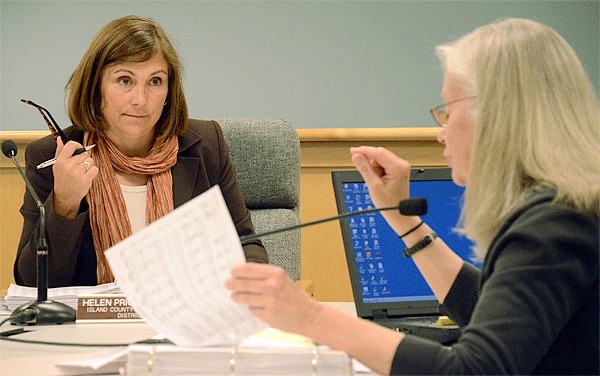Island County Commissioners have rolled up their sleeves and begun work on yet another tough budget.
Last week marked the conclusion of a series of meetings in which department heads and elected officials presented their proposed 2013 budgets to the board. Although the county’s bottom line is expected to remain largely the same, with no cuts expected, the board was hit with nearly $1.9 million in budget requests.
Most came from departments that are struggling as staff members attempt to maintain existing levels of service in the wake of about $6 million in cuts to the general fund over the past four years.
Commission Helen Price Johnson, who is chairwoman of the board, said the desperation expressed by so many government leaders through budget requests came as little surprise.
“This is what smaller government looks like and it is hard,” Price Johnson said.
The writing, she added, has been on the wall since 2010 when a proposed $2 million tax hike failed to pass voter approval.
“When Proposition 1 didn’t pass, it was clear to me this would be the result,” the commissioner said.
Sheriff requests
The bulk of the requests came from Island County Sheriff Mark Brown, who in recent years has been one of the most vocal county leaders to criticize the board for its budget decisions.
In all, he asked for an additional $1.4 million in funding on top of an existing $6.3 million budget, which includes the jail. It would pay for 10 additional patrol deputies, three more correctional officers, eight new squad cars, and the extra fuel and training that would accompany the new hires.
The sheriff currently has the largest apportionment of the general fund, representing about 29 percent of the total $21.4-million pot. Yet he argues that his office is the lowest staffed per capita in the state with just 0.6 officers per 1,000 residents.
At the same time, he maintains that Island County is the ninth largest unincorporated population and the fifth greatest in density.
The sheriff’s budget presentations were marked by heated discussions between the sheriff and the board over a range of topics, from vehicle replacement policies to deputy overtime expenses.
Although there was much disagreement, particularly over Brown’s adamant stance that law-and-justice expenses should be the board’s top priority, the sheriff said later that a “fairly frank conversation” was needed.
He also acknowledged that his full budget request likely exceeds the current capacity of county coffers. But Brown said it was still his duty to make clear to the board the severity of his department’s lack of manpower.
“The fact that it may not be in the budget is a reality to me but that doesn’t reflect my need,” he said.
Budget Director Elaine Marlow confirmed that funding Brown’s full request would require extreme measures. Money would have to be taken from other departments and the vast majority is used to pay for services that are required by the state, she said.
Even funding the requests of other county departments, all of which pale in comparison in terms of amount to sheriff’s proposal, will be tricky.
Other needs
Most of the departments with the largest budgets — Island County Public Health, Public Works and Human Services — have made what are largely budget-neutral proposals.
Public health is facing a $52,000 deficit, but Director Keith Higman said he’s hopeful the majority will be picked up with grant funding.
Human Services is receiving additional funding over last year for several programs, but all the money comes from a special sales tax. It’s what’s referred to as non-discretionary funding and can’t be use to pay for unrelated expenses, such as cops.
Public Works is not asking for an increase, Marlow said.
Each of the departments command multi-million dollar budgets, but the vast majority of their funding comes from other sources, such as grants and fees, which is also non-discretionary.
Island County Auditor Sheilah Crider is asking for $110,000 in additional funding to replace an accountant lost in 2010 and to cover the cost of hiring a replacement chief deputy.
The Island County treasurer is asking to retain a part-time administrative assistant to help with a backlog of supplement processing — less than $10,000 — and the General Services Administration is asking for an additional $30,000 for public defense for the hiring of experts in upcoming felony cases.
The Island County WSU Extension office is asking for about $2,500 for forestry related programs. The office currently receives about $100,000 from the general fund; about $25,000 goes to the state-mandated noxious weed program and the remainder is spent largely on salaries, which is more than matched by university funding.
District Court is requesting the hours of a handful of employees be restored from 35 hours to 40 hours a week at a cost of about $40,000.
The county has been working to implement a geographic information and data imaging system. The IT department is looking for about $72,000 to hire someone to manage the new system. Also requested is a 24-hour per week mailroom/custodian position, which tabs out to $20,000.
The planning department, clerk and prosecutor have also asked for increases, totaling about $205,000.
What’s next
Now that the board has heard from all the departments, it has begun the arduous task of formulating a working budget. With so little money to go around, the process will not be easy.
“The only way a request could be granted is by taking it from someone else,” Price Johnson said. “I wish we had the resources to help them.”
Each board member is being tasked with formulating their own budget proposal and they will be hashed out over a series of workshops this month.



